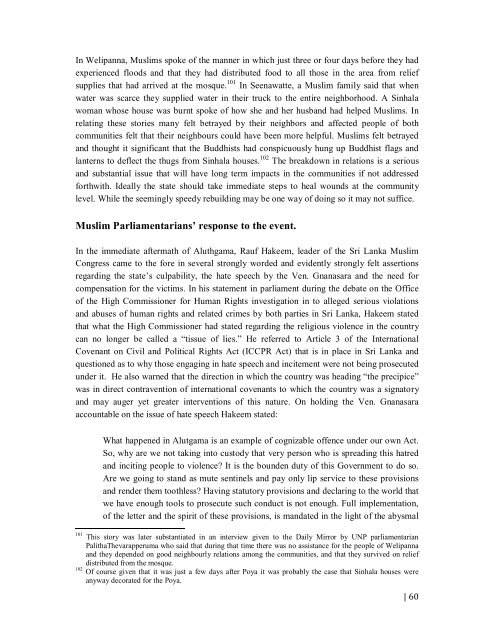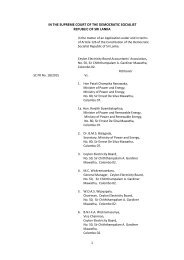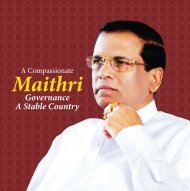Create successful ePaper yourself
Turn your PDF publications into a flip-book with our unique Google optimized e-Paper software.
In Welipanna, Muslims spoke of the manner in which just three or four days before they had<br />
experienced floods and that they had distributed food to all those in the area from relief<br />
supplies that had arrived at the mosque. 101 In Seenawatte, a Muslim family said that when<br />
water was scarce they supplied water in their truck to the entire neighborhood. A Sinhala<br />
woman whose house was burnt spoke of how she and her husband had helped Muslims. In<br />
relating these stories many felt betrayed by their neighbors and affected people of both<br />
communities felt that their neighbours could have been more helpful. Muslims felt betrayed<br />
and thought it significant that the Buddhists had conspicuously hung up Buddhist flags and<br />
lanterns to deflect the thugs from Sinhala houses. 102 The breakdown in relations is a serious<br />
and substantial issue that will have long term impacts in the communities if not addressed<br />
forthwith. Ideally the state should take immediate steps to heal wounds at the community<br />
level. While the seemingly speedy rebuilding may be one way of doing so it may not suffice.<br />
Muslim Parliamentarians’ response to the event.<br />
In the immediate aftermath of Aluthgama, Rauf Hakeem, leader of the Sri Lanka Muslim<br />
Congress came to the fore in several strongly worded and evidently strongly felt assertions<br />
regarding the state’s culpability, the hate speech by the Ven. Gnanasara and the need for<br />
compensation for the victims. In his statement in parliament during the debate on the Office<br />
of the High Commissioner for Human Rights investigation in to alleged serious violations<br />
and abuses of human rights and related crimes by both parties in Sri Lanka, Hakeem stated<br />
that what the High Commissioner had stated regarding the religious violence in the country<br />
can no longer be called a “tissue of lies.” He referred to Article 3 of the International<br />
Covenant on Civil and Political Rights Act (ICCPR Act) that is in place in Sri Lanka and<br />
questioned as to why those engaging in hate speech and incitement were not being prosecuted<br />
under it. He also warned that the direction in which the country was heading “the precipice”<br />
was in direct contravention of international covenants to which the country was a signatory<br />
and may auger yet greater interventions of this nature. On holding the Ven. Gnanasara<br />
accountable on the issue of hate speech Hakeem stated:<br />
What happened in Alutgama is an example of cognizable offence under our own Act.<br />
So, why are we not taking into custody that very person who is spreading this hatred<br />
and inciting people to violence? It is the bounden duty of this Government to do so.<br />
Are we going to stand as mute sentinels and pay only lip service to these provisions<br />
and render them toothless? Having statutory provisions and declaring to the world that<br />
we have enough tools to prosecute such conduct is not enough. Full implementation,<br />
of the letter and the spirit of these provisions, is mandated in the light of the abysmal<br />
101 This story was later substantiated in an interview given to the Daily Mirror by UNP parliamentarian<br />
PalithaThevarapperuma who said that during that time there was no assistance for the people of Welipanna<br />
and they depended on good neighbourly relations among the communities, and that they survived on relief<br />
distributed from the mosque.<br />
102 Of course given that it was just a few days after Poya it was probably the case that Sinhala houses were<br />
anyway decorated for the Poya.<br />
| 60




